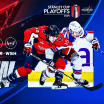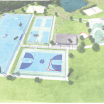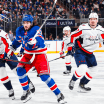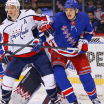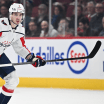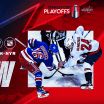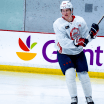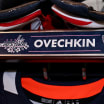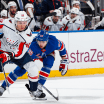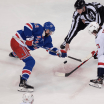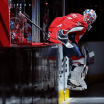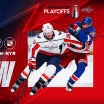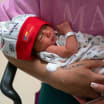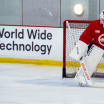That's Entertainment - Whenever the Caps and Penguins get together, whatever the time of year, you can expect to be entertained. The two teams met for the first time in nearly two months on Tuesday night in Pittsburgh, and it was a wild one.
POSTGAME NOTEBOOK: Caps 4, Pens 3 (OT)
Caps prevail in a wild one on Orlov's goal in overtime, Samsonov sets an NHL record and ties a franchise mark from 1975, Dowd's disallowed goal, more
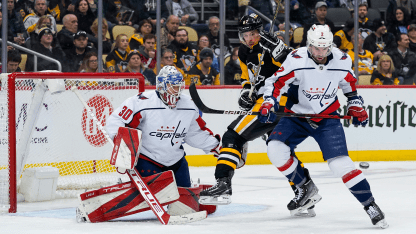
The Caps won it 4-3 in overtime on Dmitry Orlov's goal in the final minute of the extra session.
Washington overcame the loss of starting goaltender Vitek Vanecek just over six minutes into the first period, getting a stellar performance from Ilya Samsonov in relief. Samsonov was peppered with shots from the outset, but he stopped 43 of the 45 shots he faced in 57:34 on the clock, including all 33 at even strength. The total is the second highest single-game save total of his career; Samsonov stopped 46 saves in a 5-4 loss to the Panthers in Florida on Nov. 30.
Samsonov's 43 saves in a relief effort is tied for the third most in a game in NHL history, and it ties a Washington franchise mark that stood alone since late in the team's first season in the League. Samsonov matched Ron Low's 43 saves in a March 15, 1975 at Pittsburgh, a 12-1 Pens victory. Samsonov does hold the NHL record for most saves in a relief effort in a game his team won. (Stick tap to Japers' Rink for the notion and to Tommy Chalk for the confirmation.)
Somewhat ironically, Bob Johnson holds the NHL record for most saves in a relief effort in the NHL with 47. He was with the Penguins when he established the mark in a Nov. 30, 1974 game against Buffalo. Bob's son Brent Johnson was also a goaltender in the NHL, and he toiled for both the Capitals and the Penguins.
When Orlov scored in overtime to give Washington the win, it marked the end of a streak of nine straight regular season overtime victories for Pittsburgh over the Caps. Tuesday's overtime victory was the Caps' first against the Pens in the regular season since Dennis Wideman won it for Washington in overtime on Oct. 13, 2011 in Pittsburgh, scoring against … Brent Johnson.
Washington also overcame a puzzling disallowed goal from Nic Dowd (more on that below) that would have tied the game at 3-3 just ahead of the midpoint of the middle period.
The Caps did score some key goals at key moments of the game to keep it within reach; they were out-attempted 40-16 at 5-on-5 in the game's first 40 minutes and were outshot by a whopping 23-7 in the second period. Orlov's first goal of the game came with six seconds left on the Washington power play and with 3:09 remaining in the first, tying the game at 2-2.
Daniel Sprong, who took two minor penalties in the first period, scored a huge goal against his former team late in the second period. Sprong's goal came on a remarkable individual effort, tying the game at 3-3 with 41.3 seconds left in the second. That goal allowed the Caps to enter the third period all even, despite the disparity in shots and shot attempts to that point of the contest. Sprong's goal was the only 5-on-5 goal of the seven scored in the game.
Pens winger Bryan Rust scored a pair of power play goals to continue his incredible offensive hot streak. Tuesday's game marked his second straight two-goal game and his fifth multi-goal game since the turn of the calendar. In his last 16 games, Rust has 13 goals and 15 assists for 28 points.
Finally, Tuesday's game marked the first time in nearly three years that the Penguins lost a game in which they struck for three or more power-play goals.
"Even before I came here," says Dowd, " I used to watch these guys play each other and it's kind of the same thing. You guys have been following them for a while too, and it just seems like every time we play each other there's something weird that happens.
"So yeah, I didn't surprise me at all that we went back and forth like that and some guys scored some big goals at big times. And our goaltending was great."
Dowd Disallowed -At 7:05 of the second, Dowd scored what was apparently his second goal of the game, a nifty deflection of linemate Garnet Hathaway's shot from the point. But Pittsburgh issued a coach's challenge, alleging goaltender interference.
Amateur coach's challenge enthusiasts all over the globe watched and waited, figuring there was no way this goal could be overturned based on the video evidence. Dowd didn't touch or impede with Pens goalie Tristan Jarry, and he didn't stand in front of him waving his arms a la Sean Avery, either. Dowd did exactly and precisely what players are coached to do and supposed to do, take the goalies eyes away, provide a screen and try to get a piece of the incoming shot.
But as those of us who've occupied space on this planet for a few years know that inconsistency is the only consistent element of video review and coach's challenges. We were not surprised when the goal was disallowed.
The NHL Situation Room - in its infinite and random wisdom - issued this statement shortly after disallowing the Dowd goal:
"Video review determined Washington's Nic Dowd had a significant presence in the crease which impaired goaltender Tristan Jarry's ability to play his position prior to his goal. The decision was made in accordance with Rule 69.1, which states in part, "Goals should be disallowed only if: (1) an attacking player, either by his positioning or by contact, impairs the goalkeeper's ability to move freely within his crease or defend his goal." (bold and italics theirs)"
It would have been useful if the Situation Room had pointed out the exact moment of Dowd's interference, but that's apparently a big ask.
"I disagree," says Dowd. "I honestly think that's probably one of those ones that goes 50/50. I thought the fact that they called it a goal on the ice gave us a chance; I thought it was going to be difficult for them to overturn it.
"In my opinion, I was kind of told that I inhibited the goalie from getting - I guess - to a position to make the save, but I don't know. I didn't touch him. I didn't bump into him. And then I was out of the crease before the shot was taken, right? So that's my opinion on it."
Asked his thoughts on the call, Caps coach Peter Laviolette was concise and to the point.
"I disagree with it."
Number Nine, Number Nine -The game-winner was Orlov's second goal of the game; he scored his first on a Washington power play late in the first. Orlov now has two power-play goals this season, a single-season career high. With seven goals on the season, Orlov is one shy of matching his total from last season.
Orlov has netted four game-winning goals this season, tied with Tom Wilson for the team lead. The overtime game-winner is the third of his career; only Mike "Game Over" Green has more among Washington defensemen. Green had eight overtime game-winners for the Caps.
Powering Up -The Caps have scored power play goals in consecutive games for the first time since doing so in three straight games from Nov. 24-26. Washington has had four straight power-play goals from players other than Alex Ovechkin, the first time that's happened since Oct. 27-Nov. 14 when the Caps scored six straight power-play goals without Ovechkin lighting the lamp.
By The Numbers - John Carlson led the Caps with 26:56 in ice time … Evgeny Kuznetsov led the Caps with seven shots on net and 10 shot attempts … Nick Jensen and Tom Wilson had five hits each to lead Washington … Nine different Caps combined to block a total of 17 shots in support of Samsonov, with Orlov leading the way with four … Dowd won 15 of 23 face-offs (65 percent).

